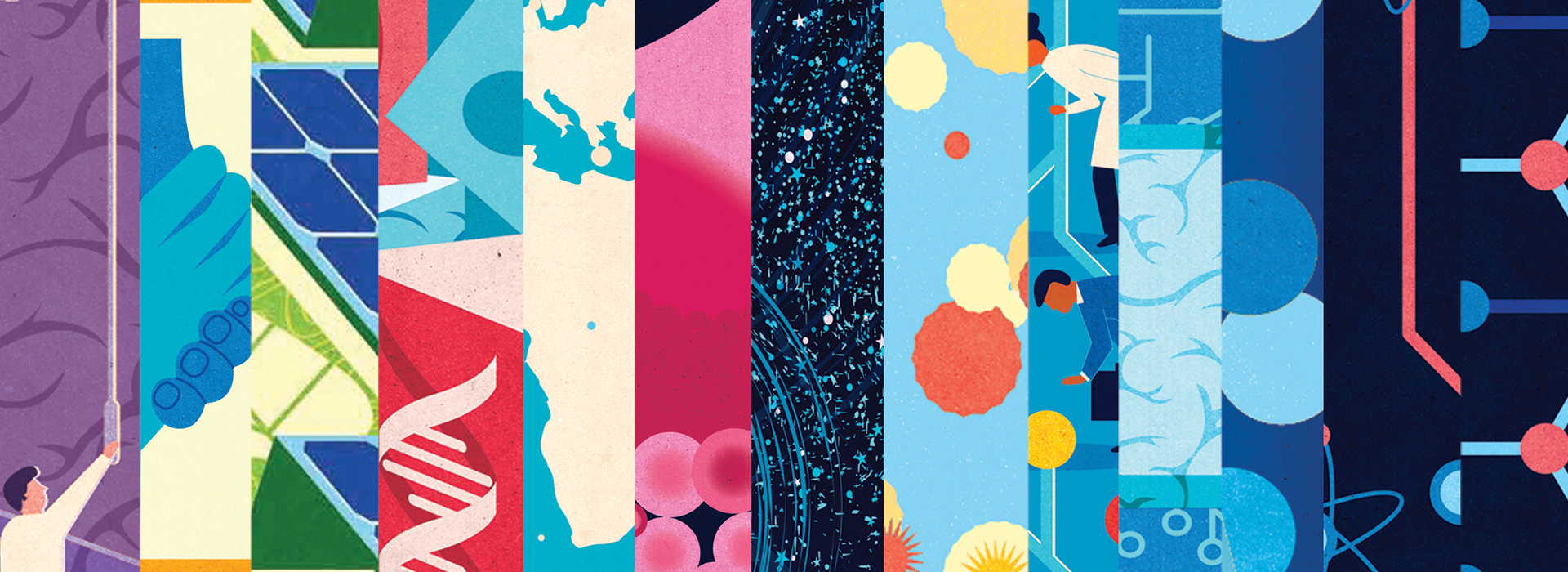By: Jon Farrow
8 Apr, 2019

New portfolio takes risks, convenes extraordinary minds to address science and humanity’s most important questions.
Top scientists and scholars from around the world have new opportunities for collaboration today with the announcement of CIFAR’s new research portfolio and the expansion of the Canada CIFAR AI Chairs program. The 13 CIFAR research programs address critical questions across four interdisciplinary theme areas: Life & Health, Individuals & Society, Information & Matter and Earth & Space.
Life & Health
Individuals & Society
Earth & Space
Information & Matter
“For almost 40 years, CIFAR has supported fundamental research and innovation across borders and disciplines,” says Dr. Alan Bernstein, President and CEO of CIFAR. “The portfolio we are announcing today will change conversations across disciplines and result in the scientific, technological, and scholarly advancements of tomorrow.”
Each program addresses complex questions and engages international and interdisciplinary networks of researchers and scholars. CIFAR provides a sustained, long-term commitment to their progress by convening meetings and providing catalyst funds for new directions of inquiry. The environment of intellectual freedom fosters deep collaboration and trust between CIFAR fellows. At meetings, they share and critique preliminary findings and data, often prior to publication, and provide insights from peers across disciplines.
“I think CIFAR is going to be particularly catalytic for us,” says Barbara Sherwood-Lollar, professor of earth sciences at the University of Toronto and the co-director of the new Earth 4D: Subsurface Science and Exploration program. “The program will enable us to bring together people from extremely different perspectives, and then give them the intellectual freedom to challenge each other, challenge themselves and change thinking.”
While CIFAR’s impact on the research process is immediate, wider social benefits can take longer to be realized. The organization bridges this gap by connecting its research programs to global thought leaders outside of academia through knowledge mobilization. These exchanges enrich research and stimulate new social, economic and technical innovations. For example, CIFAR fellows in the Humans & the Microbiome program are working with public health leaders to create the first educational curriculum on the Microbiome and Healthy Living.
More information on the CIFAR’s research programs is available here.
As part of the Pan-Canadian AI Strategy, CIFAR also announced an expansion of the Canada CIFAR AI Chairs program, bringing the total number of chairs to 46, from 29 announced in December 2018. The prestigious Canada CIFAR AI Chairs program, funded by the Federal government with $86.5 million over five years, provides researchers with long-term, dedicated research funding to support their research programs and help them to train the next generation of AI leaders. The 46 Chairs are named in partnership with Canada’s three national AI Institutes: Amii (Edmonton), Mila (Quebec) and the Vector Institute (Toronto), as well as twelve universities and hospitals across the country.
“The Canada CIFAR AI Chairs Program is core to Canada’s ongoing leadership in machine learning research and training,” says Dr. Elissa Strome, Executive Director of the CIFAR Pan-Canadian AI Strategy. “As the first country to develop a national AI strategy and the birthplace of deep learning, Canada is uniquely positioned to advance machine learning research and responsible AI.”
Canada is uniquely positioned to advance machine learning research and responsible AI.”
The Canada CIFAR AI Chairs program aims to increase the number of outstanding artificial intelligence researchers and skilled graduates in Canada, and to enhance Canada’s international profile in AI research and training.
More information on the Canada CIFAR AI Chairs Program and the full list of chairs is available here.
CIFAR has a record of picking winners. The deep learning revolution in artificial intelligence was kickstarted by CIFAR support in 2004. In that year Geoffrey Hinton (Google, University of Toronto, Vector Institute) launched a new program called Neural Computation and Adaptive Perception, the predecessor to today’s Learning in Machines & Brains (LMB) program at CIFAR. Today, Yoshua Bengio (Mila, Université de Montréal) and Yann LeCun (Facebook, NYU) lead LMB, asking fundamental questions about how humans learn and how to apply that understanding to machines. Together, the three AI luminaries were recently awarded the ACM A.M. Turing Award — the “Nobel Prize of Computing”. Their work has enabled technologies like voice and image recognition and real-time translation, among many others.
“CIFAR has an impressive track record of supporting innovation and is leading the world’s first national AI strategy,” says the Honourable Kirsty Duncan, Minister of Science and Sport. “These new Chairs will maintain Canada’s status as an AI trailblazer as well as help create jobs and growth across Canada.”
While not every CIFAR program will radically transform our daily lives the way AI has, many transform science itself by introducing new techniques, approaches and bodies of knowledge that are core to innovation. The organization is meticulous and rigorous in its selection of research questions and the fellows chosen to pursue them. CIFAR is recognized around the world for its long-term vision and an unparalleled approach to the world’s most complex questions. It is a leader in convening extraordinary minds, fostering international collaboration and creating new knowledge.
Notifications